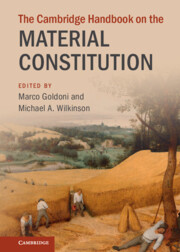Book contents
- The Cambridge Handbook on the Material Constitution
- The Cambridge Handbook on the Material Constitution
- Copyright page
- Contents
- Contributors
- Introduction
- Part I History
- 1 The Tradition of the Material Constitution in Western Marxism
- 2 The Soul of the State
- 3 Laski’s Materialist Analysis of the British Constitution
- 4 Rudolf Smend’s Legacy in German Constitutional Theory
- 5 The Constitution in the Material Sense According to Costantino Mortati
- 6 The Material Constitution of the Dual State
- 7 ‘A Certain Shadowy Totality’
- 8 The Material Constitution in Greek Constitutional Thought
- 9 The Constitution As Social Compromise
- 10 ‘Self-Justifying Law of Constitutional Law’
- Part II Challenges
- Part III Analyses
- Index
4 - Rudolf Smend’s Legacy in German Constitutional Theory
from Part I - History
Published online by Cambridge University Press: 15 January 2023
- The Cambridge Handbook on the Material Constitution
- The Cambridge Handbook on the Material Constitution
- Copyright page
- Contents
- Contributors
- Introduction
- Part I History
- 1 The Tradition of the Material Constitution in Western Marxism
- 2 The Soul of the State
- 3 Laski’s Materialist Analysis of the British Constitution
- 4 Rudolf Smend’s Legacy in German Constitutional Theory
- 5 The Constitution in the Material Sense According to Costantino Mortati
- 6 The Material Constitution of the Dual State
- 7 ‘A Certain Shadowy Totality’
- 8 The Material Constitution in Greek Constitutional Thought
- 9 The Constitution As Social Compromise
- 10 ‘Self-Justifying Law of Constitutional Law’
- Part II Challenges
- Part III Analyses
- Index
Summary
Compared to figures like Hermann Heller or Carl Schmitt, Rudolf Smend´s heritage in German constitutional law seems to be at the same time more evident and more obscure. More evident because powerful constitutional lawyers like Konrad Hesse, Horst Ehmke and Peter Häberle were heavily influenced by Smend and because, last but not least, the German Federal Constitutional Court took up several parts of Smend´s doctrine in its judgements – mostly in the area of fundamental rights. More obscure because it is highly debatable not only whether Smend´s legal thought is actually still alive in dominant constitutional doctrines like the proportionality test, the balancing of constitutional goods, cooperative federalism or even fundamentals of immigration and citizenship law – but also whether Smend´s influence on Germany´s material constitution has been, on the whole, advantageous for post-war legal development. Beyond that, it is worthwhile looking at how Smend´s ideas were assimilated, but also transformed in important ways in highly influential casebooks and monographs such as Konrad Hesse´s Grundzüge des Verfassungsrechts der Bundesrepublik Deutschland.
- Type
- Chapter
- Information
- The Cambridge Handbook on the Material Constitution , pp. 76 - 88Publisher: Cambridge University PressPrint publication year: 2023
- 1
- Cited by

